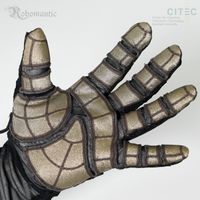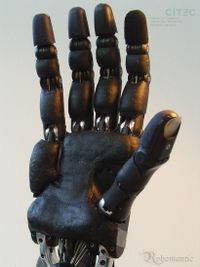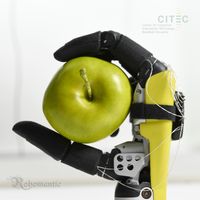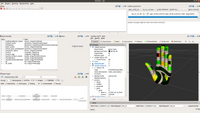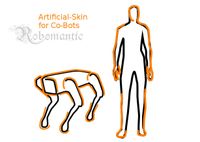Robomantic enterprise
Robomantic is the tentative company name of our upcoming spin-off from CITEC, Bielefeld University.
We develop elastic tactile sensor technology for touch sensation with currently three product segments:
Multimodal Data-Glove (Touch, Posture, Orientation) | A measuring instrument for the research of human manual intelligence as well as for the acquisition of forces in the field of work ergonomics, product ergonomics and ergo therapy.
Artificial-Skin | Tactile sensors for robot hands. These are used in research to test and optimize gripping strategies. In the future, they will also be used in industry to equip co-bots for safe interaction with semi-autonomous assistance systems.
Tactile-Units | Equipment for the extension of modern hand prostheses for a natural sensing of tactile sensory stimuli.
EU and NRW Funding
Since February 2021, the enterprise Robomantic - tactile sensors for humans and robots - has been supported by the European Regional Development Fund.
The objectives of this project can be divided into the three areas of hardware, software and business. Within the hardware sub-goal, our individually tested manufacturing processes are to be unified into a production line. Another sub-goal is the integrative optimization of our software packages to make their functions intuitive for users. The comprehensive planning of the market entry from process cost optimization to the preparation of the business registration is the last sub-goal.
Progress Hardware
The systematic further development of our processes for manufacturing tactile sensors was strongly supported in the ERDF (EFRE) project with new simulation and rapid manufacturing facilities.
An object carriage was designed for holding the materials that are to be processed.
I’s dimensions are the optimum between output minimum and machinery maximum. We gained a ratio of 1/6 for the batch-width to the material infeed width. This will allow a scaling up or times six for a medium size sensor fabrication with an infeed bandwidth of the 1400mm standard width.
We designed special jigs to homogeneously stretch and stack the materials in order to reveal a consistently high quality sensor-sheet.
Progress Software
In the area of software development, the interim goal of quick SW-installation was achieved. This enables the clients to install the Robot Operating System (ROS) with the necessary extensions to drive tactile devices in just a few steps. In the past, this took 1-3 hours, but now it takes just 5-15 minutes to complete and run the full environment.
Progress Business
The market analysis shows various positive developments for the project Robomantic.
The number of robotic assistance systems (cobots) and prostheses is steadily increasing. We were able to determine that the customer benefits we evaluated with our products – µGlove, Artificial-Skin and Tactile-Units – can bring urgently needed safety to the systems. In this context, the necessary quality of robotic grippers and prostheses is only achieved through tactile feedback.
Another recent market development shows various companies with quadrupeds (four-legged robots) in their product range as well as the announcements of humanoid robots. These are in urgent need of a sensory skin to prevent damage to themselves and their environment.
Furthermore, the ergonomics, research, sports and leisure markets were analyzed and their stable development in recent years was documented.
